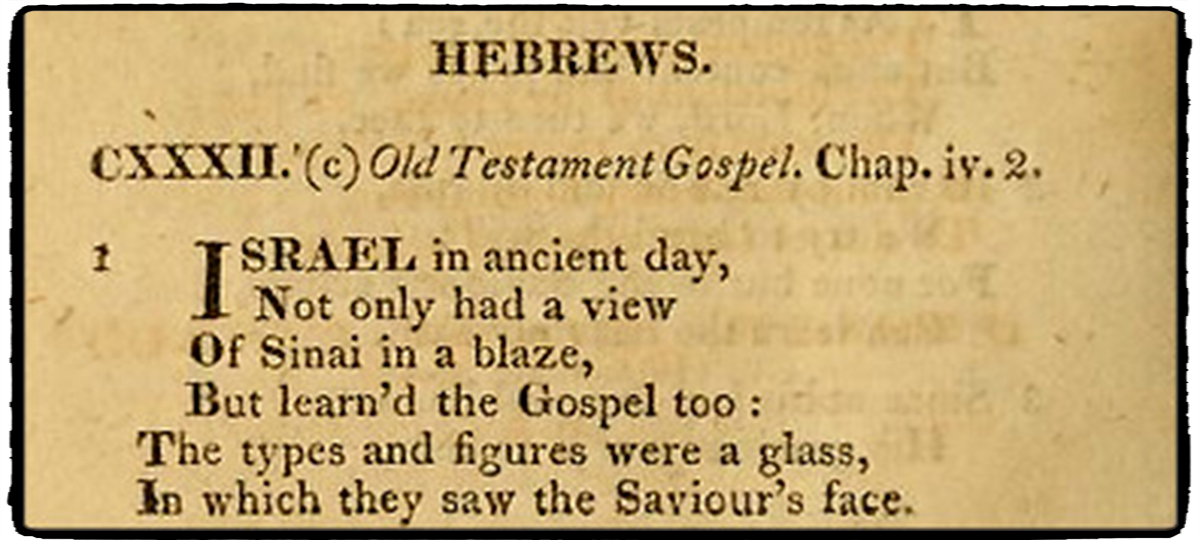John Newton’s Olney Hymn of Gospel Types
If you’ve never read through the Olney Hymns you are missing out on a great blessing. Chances are good that you’ve sung one if you worship in a church that holds a high view of historic hymnody. Two of the more memorable hymns in the project were “There is a Fountain Filled with Blood” and “God Moves in a Mysterious Way.” John Newton, the great slave-trader turned slave of Christ, wrote several of these marvelous masterpieces with his dear friend and fellow hymn-writer, William Cowper. Newton’s rational behind the hymn project was partly to encourage his spiritually depressed friend and partly to encourage the church throughout the ages with more theologically rich songs to sing. Newton wrote a hymn for each text of Scripture that had impacted him in a serious way. Paxon Jeancake writes about the history behind this hymn project in his article “Sometimes a Light Surprises: The Treasured Gift of a Troubled Soul.” He explains:
One of the “unknown tomorrows” in Cowper’s life was his providential encounter with John Newton, author of “Amazing Grace.” These two men forged a friendship that would lead to one of the most productive seasons of Cowper’s life. Newton asked Cowper to be a part of a hymn project for his local parish in Olney. Together they wrote 348 hymns over a span of about 10 years. A few of the more recognizable hymns that Cowper wrote include “There is a Fountain Filled with Blood,” “O for a Closer Walk with God,” “God Moves in a Mysterious Way,” and “Sometimes a Light Surprises.”
In the preface to the Olney Hymns Newton shares that the design of the book was not only to promote “the faith and comfort of sincere Christians,” but also “to perpetuate the remembrance of an intimate and endeared friendship.” The community and fellowship that Newton and his parish provided for Cowper was transformative. Through that relationship Cowper left the world lyrical treasures of grace and truth.
One of my favorite Olney hymns is Newton’s “How Kind the Good Samaritan.” Rich with Christological and experiential significance this hymn highlights the centrality of the Gospel in Newton’s heremenuetic:
How kind the good Samaritan
To him who fell among the thieves!
Thus Jesus pities fallen man,
And heals the wounds the soul receives.
Men saw me in this helpless case,
And passed without compassion by;
Each neighbor turned away his face,
Unmoved by my mournful cry.
But he whose name had been my scorn,
(As Jews Samaritans despise)
Came, when he saw me thus forlorn,
With love and pity in his eyes.
Gently he raised me from the ground,
Pressed me to lean upon his arm;
And into every gaping wound
He poured his own all–healing balm.
Unto His church my steps he led,
The house prepared for sinners lost;
Gave charge I should be clothed and fed;
And took upon him all the cost.
Thus saved from death, from want secured,
I wait till he again shall come,
(When I shall be completely cured)
And take me to his heav’nly home.
There through eternal boundless days,
When nature’s wheel no longer rolls,
How shall I love, adore, and praise,
This good Samaritan to souls!
I remember well the day,
When sorely wounded, nearly slain;
Like that poor man I bleeding lay,
And groaned for help, but groaned in vain.
A Christological interpretation of Scripture is discovered throughout all of the Olney Hymns, but is wonderfully highlighted in Newton’s “Old Testament Gospel,” an exposition of Hebrews 3-4. In one of the most sobering of all the warning passages in Scripture, Newton explains that the Gospel types that God gave to Israel in the wilderness pointed beyond themselves to what Israel and we are to believe. Israel’s failure was a failure to believe the Gospel. Newton wrote:
Israel in ancient days,
Not only had a view
Of Sinai in a blaze,
But learned the gospel too:
The types and figures were a glass
In which they saw the Savior’s face.
The paschal sacrifice,
And blood–besprinkled door,
Seen with enlightened eyes,
And once applied with pow’r;
Would teach the need of other blood,
To reconcile an angry God.
The Lamb, the Dove, set forth
His perfect innocence,
Whose blood, of matchless worth,
Should be the soul’s defense:
For he who can for sin atone,
Must have no failings of his own.
The scape–goat on his head
The peoples’ trespass bore,
And to the desert led,
Was to be seen no more:
In him, our Surety seemed to say,
“Behold, I bear your sins away.”
Dipped in his fellows’ blood,
The living bird went free,
The type, well understood,
Expressed the sinner’s plea;
Described a guilty soul enlarged,
And by a Savior’s death discharged.
Jesus I love to trace
Throughout the sacred page;
The footsteps of thy grace,
The same in every age!
O grant that I may faithful be
To clearer light, vouchsafed to me.



